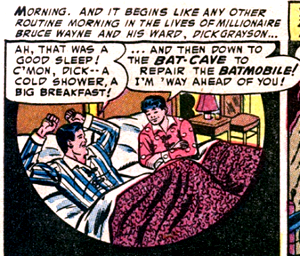The Time Tunnel: "Rendezvous with Yesterday" is a solid pilot. The frustrating thing about Irwin Allen shows is that they tended to have strong, smart pilots with good writing and good production values, then just stopped trying and degenerated into cheap, goofy formula. But this is a neat, engaging mini-movie in its own right, whatever became of the show afterward. The visual spectacle of Project Tic-Toc is wonderful, miniatures and matte paintings evocative of
Forbidden Planet's Krell complex -- although it stretches disbelief to the limit that the US government would fund an underground complex 800 stories deep with thousands of personnel to develop a time-travel technology that wasn't even proven to work yet. I mean, 800 stories? That's something like 2.4 kilometers underground. Granted, there are some mines that run that deep or deeper, but it's still pretty extreme. I mean, there's a miniature shot of maybe 5 giant complexes that Doug says contain 1200 people each -- that's 6000 people. That's a really enormous undertaking with no guarantee of payoff. Still, the FX shots were wonderful, and it still bewilders me that they didn't reuse them in later episodes.
I do find it very contrived that, of all the places and times in history Tony could've been randomly sent, he happened to end up on the
Titanic two days before the end. But the drama was fairly effective there, though I think they played fast and loose with the historical details and didn't use any of the real crew or passenger names. (Though Michael Rennie remained nameless as the captain, so he could've been Edward Smith.) Also, it was contradictory that they said Tony was being held right where the iceberg would hit, but then later he and Doug were back in the same room when the berg hit and the room was undamaged. I suppose maybe it was meant to be an identical room elsewhere, but there's no dialogue explaining that, so it's an oversight.
There are some interesting things about the guest cast here. For one thing, it features both Batman and Catwoman. Lee Meriwether (Ann McGregor), of course, played Catwoman in the 1966
Batman feature film. And Gary Merrill (Senator Clark) was one of the three actors who played Batman on the
Adventures of Superman radio series, along with Stacy Harris and Matt Crowley, although online sources disagree over which one was the main actor. Merrill and Meriwether have several scenes together. We also have a bunch of
Star Trek guests -- in addition to regulars James Darren, Whit Bissell, and Meriwether, we have John Winston as a
Titanic guard. Plus of course there's Michael Rennie, Klaatu himself. (And apparently Dennis Hopper has a bit part as a passenger.)
Annoyingly, MeTV showed the
Land of the Giants pilot, "The Crash," in a format stretched out for widescreen, which on my old TV means that the sides are cut off as well as the picture being squished. I don't think I'll continue watching if they continue doing that. Heck, I can just watch it on Hulu, once I can afford the luxury of renewing my Hulu subscription.
Still, I did watch the pilot, and it has an interesting disaster-movie feel, the way we start with the pilots and stewardess and the diverse bunch of passengers. The latter are given backgrounds that rarely matter much in the series ahead, but it's an interesting start -- although the attempt to replicate Dr. Smith and Will with Commander Fitzhugh and Barry doesn't work that well. It actually reminded me a bit of the start of the
Planet of the Apes series, which also involved a spacecraft from the early 1980s falling through a warp and landing on a hostile world. (Worth noting that the scriptwriter of this pilot, Anthony Wilson, would later develop the PotA series.) I think I like Steve Burton and Dan Erickson better than Virdon and Burke, though. In particular, Don Marshall's Dan comes off wonderfully here, an African-American lead who was smart and confident and authoritative and calmly refused to submit to bullying by white men (that was kept subtextual, of course, but I felt it was there).
Notably, the giants don't speak at all in the pilot; perhaps the thinking was that they were aliens and thus didn't speak English, but if, so that was quickly dropped for the series ahead -- and understandably so, since it would've greatly limited the storytelling.
I'd forgotten that the pilot was scored almost entirely with stock
Lost in Space cues, mostly by John(ny) Williams and Herman Stein -- particularly Williams's "Monster Rebels" from "The Reluctant Stowaway" for the space warp scene, Stein's "The Comet Cometh" from "The Derelict" for the forest scenes, and Williams's "Landing" from "Island in the Sky" for the later action scenes, IIRC. The end titles credit the music to Alexander Courage, but I suppose that's mainly for the unmemorable title theme they used here. I think it gets replaced by a Williams theme in the next episode.
Watching the APES pilot again for the first time in decades, I was struck by the fact that there were no female characters in it at all. In retrospect, , I'm surprised that that the show didn't include a sexy "Nova"-like character as a regular: perhaps a primitive human female who joined our heroes on their quest?
Maybe the show would've run longer if they had?

I was equally struck by the all-white cast. They didn't even cast a black guy as the dead third astronaut. I mean, the original movie had Dodge as part of Taylor's crew, and the animated series would have a white man and a black man as equal protagonists. But this show's cast is pure white so far -- although we do get appearances by Roscoe Lee Browne and Percy Rodrigues in later episodes.



